Survey: The Cost of a Power Cut to Your Business & Staff

Take a moment to think about your work environment. How severely would being without electricity impact how you work? No computer, no router, no phone calls, message, emails… No kettle! The list goes on. Now imagine the impact if everyone you work with lost power at the same time.
How many people do you work with? How many rely on powered systems? How many use local servers to store information? What impact would sustained downtime have on revenue? These are all essential questions business leaders need to be asking.
But it’s not just your immediate tech that could go down with the power, but also mission-critical equipment like servers and networks. This could result in a significant loss of data and unsaved work. Even something as minor as fluctuations in voltage can damage servers, which corrupts data and can cause havoc.
Is your business protected from surges or prepared for power failures?
UPS Systems surveyed 200 senior professionals in the UK to discover whether businesses were prepared for any unforeseeable power disruptions.
The Scale of the Issue
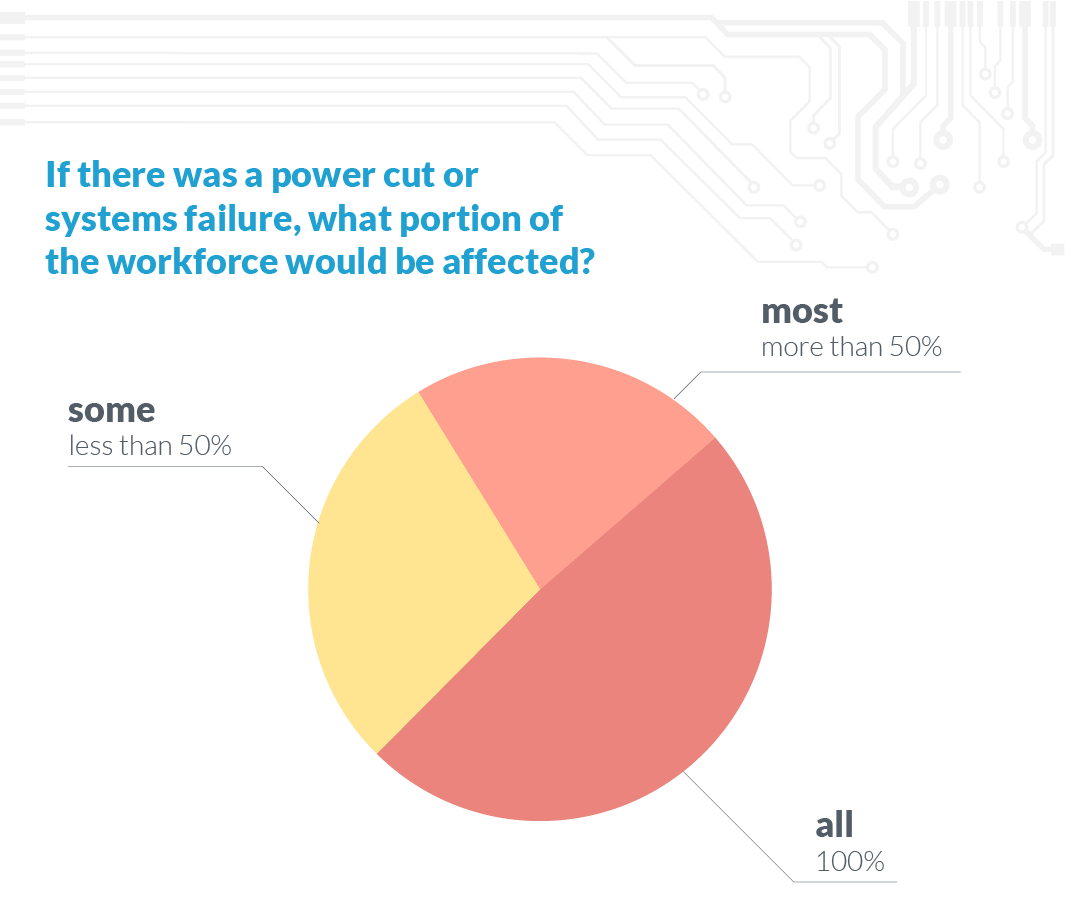
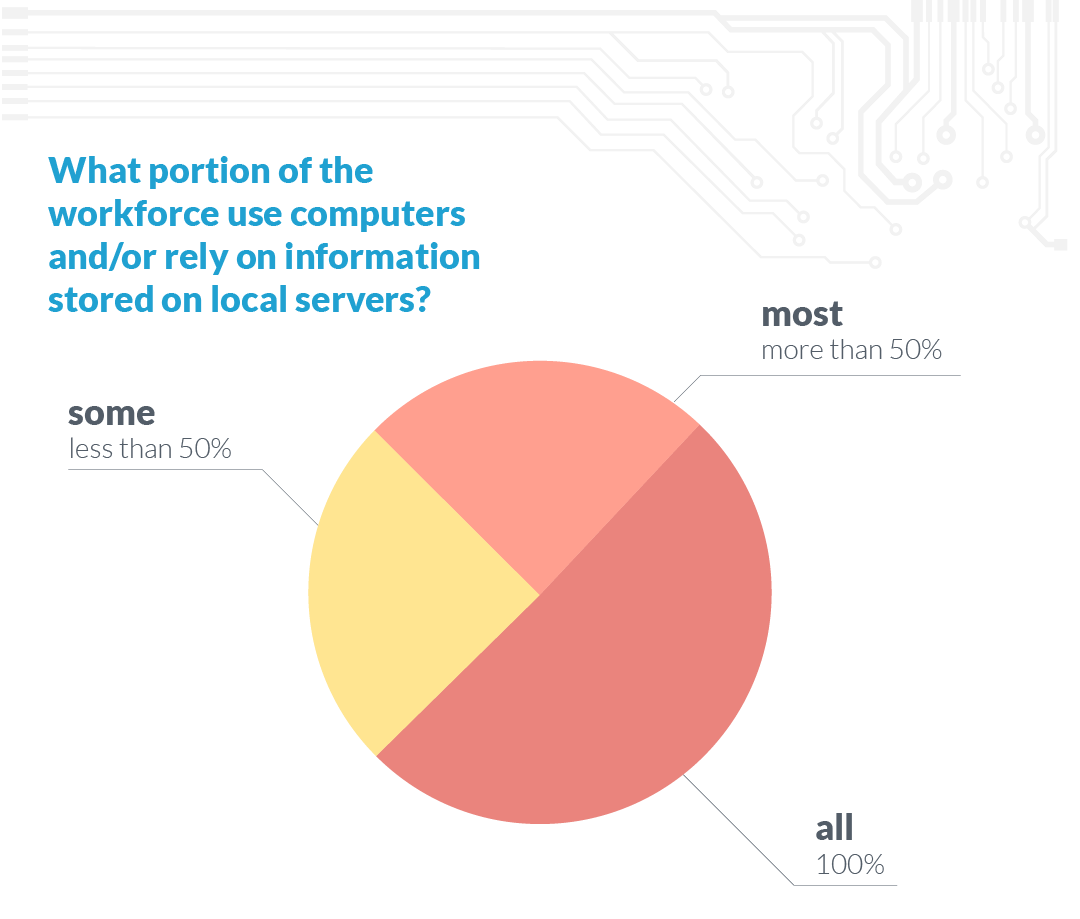
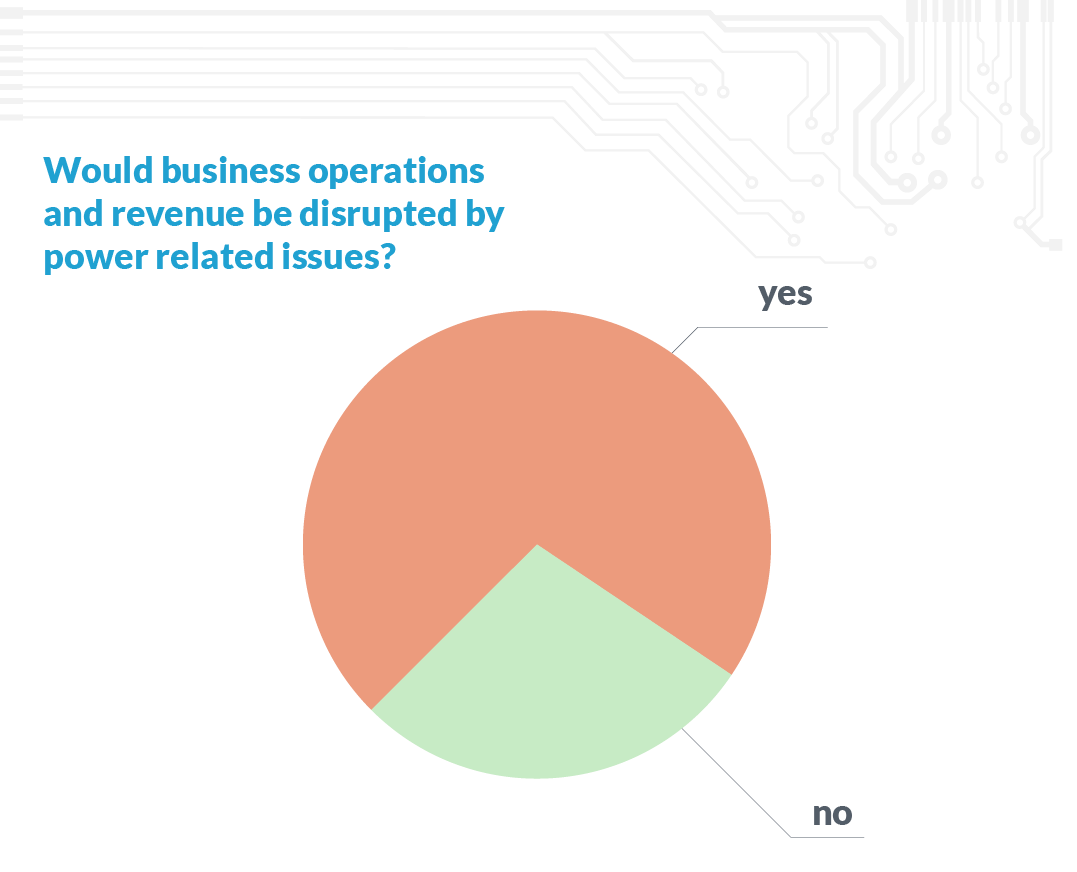
- 75% of senior professionals said that all or most of their workforce use computers and rely on information stored on local servers
- 71% said that most, or all of their workforce would be affected by a power cut or systems failure
- 49% said a power failure would impact everyone
- 72% of businesses said operations and revenue would be disrupted by power related issues
The results showed that the majority of the workforce rely on powered devices to do their jobs. The businesses surveyed all stored a lot of information locally and need such networks to remain permanently active. A power shortage would cause a major disruption to their ability to conduct business, not to mention the costs incurred by staff unable to do their jobs.
What was surprising is that, despite this reliance on powered systems, 1 in 4 business leaders still seemed to neglect their power continuity responsibilities, taking unnecessary risks with a company’s future.
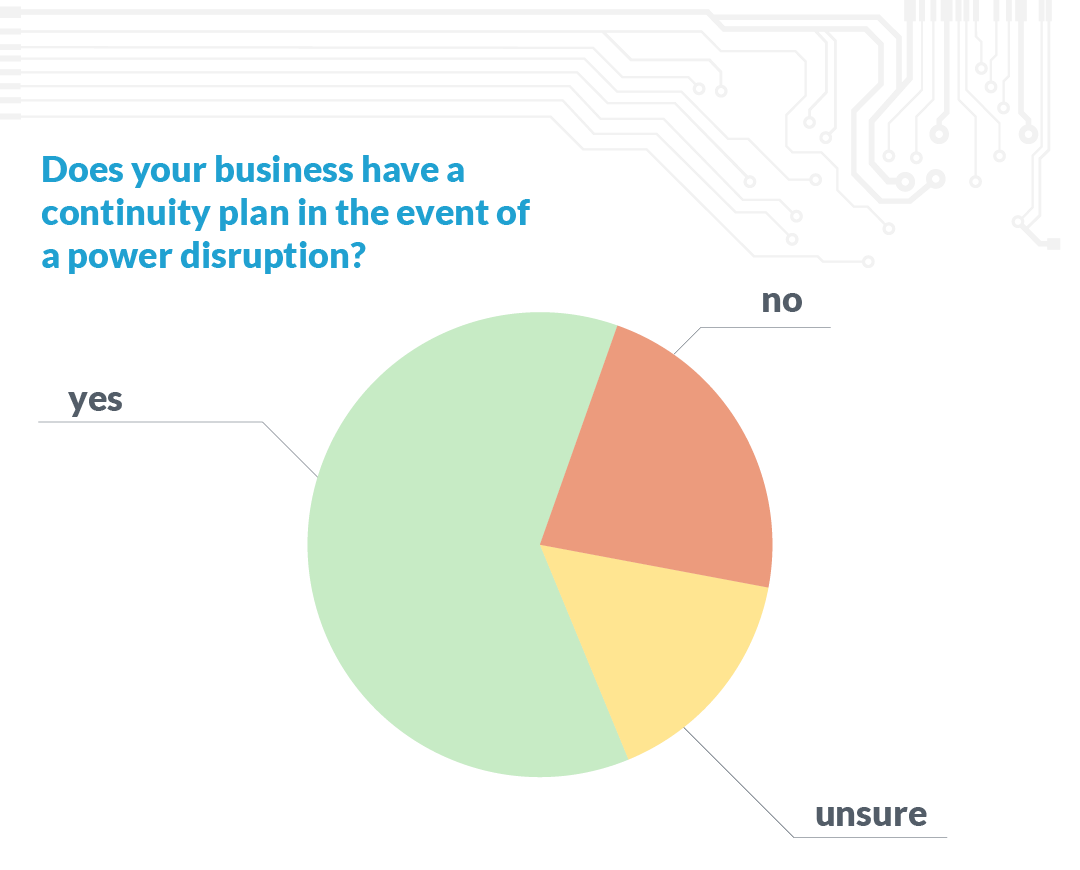
- Nearly 1 in 4 business (23%) may have neglected power continuity and should consider the risks posed to their business
In total, over a third of the senior staff surveyed admitted to not having a continuity plan in the case of a power disruption - or they don’t know what it is if they do!
Whilst this may just be a simple case of not knowing, the detrimental impact of a power cut is serious enough to warrant the attention and awareness of senior management and not just the IT team. After all, it’s everyone’s responsibility to know where the fire escapes are in the event of an emergency, not just the fire marshals.
Are power cuts really an issue for business?
It would be easy to assume that power failures are a rare enough occurrence, or short-lived enough to ignore. Unfortunately, that’s not the case.
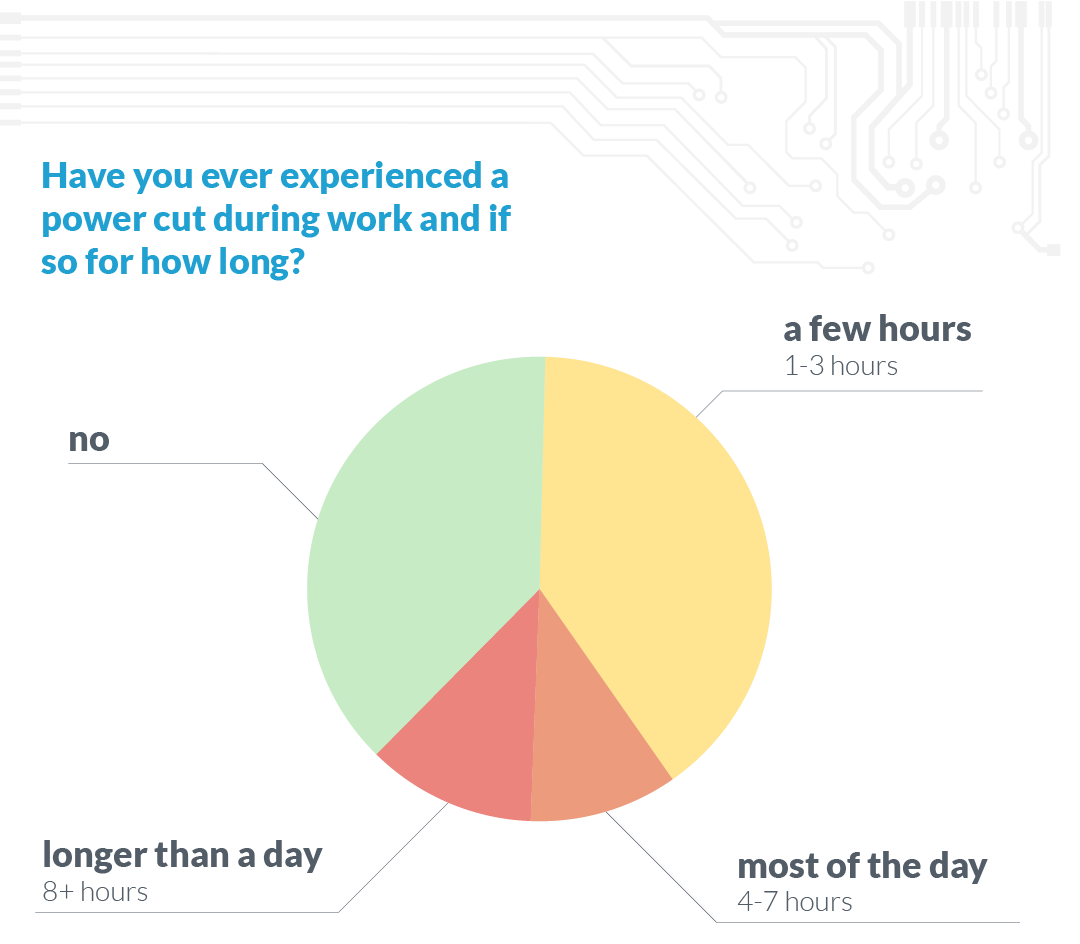
- 62% of businesses in the UK have lost power at some stage with staff complaining that they can last from either a few hours to days or longer
- 40% have experienced power cuts lasting a few hours
- 10% have experienced power cuts lasting most of the day
- 12% have experienced power cuts lasting longer than a day
Over a long enough timeframe, it’s inevitable that a business’s offices will get struck by a power failure as a result of weather conditions or even freak incidents like a combine harvester which reportedly brought down power lines in Norfolk and a squirrel that chewed through cables in Yeovil, Somerset impacting thousands.
Unfortunately, the outlook for power issues is feared to get worse. In January 2018, a House of Lords committee warned that Brexit could leave the UK more vulnerable to energy supply shortages. Therefore, understanding how much a system failure could cost your business is imperative and it is vital you protect yourself.
The Impact of Power Issues on Revenues
Calculating the financial impact of a power cut poses a number of challenges as each business has its own operations and nuances. Moreover, the impact will be felt in every corner of the business infrastructure, not just lost time. For example:
- Loss of unsaved data or corrupted files
- Damage to sensitive equipment
- Missed deadlines
- Interrupted production
- Website downtime
- Time to reset equipment throughout a facility or reset business systems
As a result, one would have to consider the end to end business operation in order to build a complete picture.
However, there are a number of simple calculations that any business can make in order to get a sense of how much a power cut might cost your business.
For example:
- Labour Costs
Number of employees x employee rate per hour x number of hours of outage
- Revenue Loss
(Gross yearly revenue / total yearly business hours) x number of hours of outage
Such methods can be used by businesses to estimate the cost of downtime, and therefore calculate the savings that acquiring a UPS unit or generator can bring. A UPS (or uninterruptible power supply) is a backup power system that activates in the event of a power cut emergency, giving you precious minutes to prevents server crashes and loss of data.
If you have any questions about your businesses power continuity needs or would like advice on which UPS unit is right for you, get in touch with our engineering team today.
UPS Systems have been supplying backup power solutions for over 25 years and can propose a solution regardless of the size of your requirement. If you have any questions or queries, please contact us. We can supply small UPS (Uninterruptible Power Supplies) to support a home office, to a larger UPS to keep the central server running or a diesel generator to manufacturing equipment.
UPS Systems plc supply a wide range of uninterruptible power supplies including those from Riello UPS and Eaton UPS as well as the UPS battery packs designed to go with them. UPS Systems plc also offers various diesel generators and industrial generators including 60kva generator, 80kva generator and 100kva generator from a wide range of manufacturers including AKSA generator, SDMO generator and Pramac generator.
About the survey: UPS Systems surveyed 200 UK professionals on 24/08/2018 regarding their businesses use of powered technologies and continuity plans. Questions included "what portion of the workforce use computers and/or rely on information stored on local servers?", "would business operations and revenue be disrupted by power related issues?" and "what continuity plans are in place in an event of a power cut?". UPS Systems then analysed and published the results on their website.


























